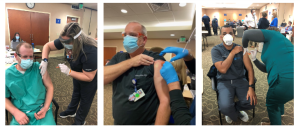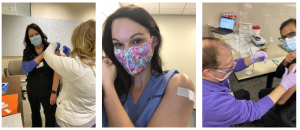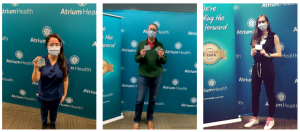
COVID-19 is now the leading cause of death in the United States, with more daily deaths than those caused by heart disease, typically the number one killer. Over 540,000 Americans have died from the coronavirus to date.
The COVID-19 pandemic, caused by the SARS-CoV-2 virus, continues to have a serious impact on many people, including cancer patients, their families, and caregivers.
Vaccines (also called immunizations or vaccinations) are used to help a person’s immune system recognize and protect the body against certain infections. Vaccines are now becoming available to help protect against COVID-19.
Currently, three COVID-19 vaccines have received emergency use authorization (EUA) from the US Food and Drug Administration (FDA):
- The Pfizer-BioNTech vaccine is authorized for people 16 years of age or older. It is given in two doses, three weeks apart.
- The Moderna vaccine is authorized for people 18 years of age or older. It is given in two doses, four weeks apart.
- The Johnson & Johnson/ Janssen vaccine is authorized for people 18 years of age or older. It is given as a single dose.
The Pfizer-BioNTech and Moderna vaccines have been found to be more than 90% effective at preventing COVID-19 infection in people who receive both doses, although they might not be as effective after only one dose. The Johnson & Johnson/ Janssen vaccine is about 66% effective at preventing COVID-19 infection but highly effective in preventing hospitalizations and death.
The Pfizer-BioNTech and Moderna vaccines contain messenger RNA (mRNA), which is genetic material. After a person receives the vaccine, the mRNA tells the cells in the body to make copies of the virus’s “spike” protein (the protein that normally helps the virus infect human cells). This doesn’t cause disease, but it does trigger the immune system to learn to act against the virus if the body is exposed to it in the future. The Johnson & Johnson vaccine, unlike Pfizer and Moderna, uses a human adenovirus that has been modified to express the virus’s “spike” protein. The modified adenovirus cannot replicate in humans and cannot cause disease.




 As there is still uncertainty around the extent to which immunocompromised patients with cancer will develop immunity in response to vaccination, vaccinated patients should continue to follow current guidance to protect themselves from exposure to COVID-19. The expert panel underscored the message that while providing the vaccine to cancer patients and their caregivers will reduce risk for infection or clinical COVID-19 disease, they emphasized the importance of continuing practices of wearing masks, social distancing, and maintaining good hand hygiene even after vaccination.
As there is still uncertainty around the extent to which immunocompromised patients with cancer will develop immunity in response to vaccination, vaccinated patients should continue to follow current guidance to protect themselves from exposure to COVID-19. The expert panel underscored the message that while providing the vaccine to cancer patients and their caregivers will reduce risk for infection or clinical COVID-19 disease, they emphasized the importance of continuing practices of wearing masks, social distancing, and maintaining good hand hygiene even after vaccination.